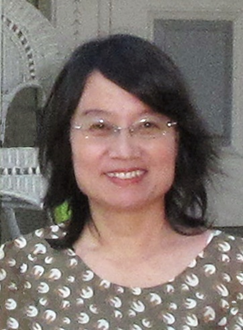职务职称:教授,博士生导师,北京航空航天大学侨联主席 |

|
所在单位:材料物理系 |
联系电话: |
电子邮箱:rli@buaa.edu.cn |
办公地点:新主楼D435 |
个人主页: https://shi.buaa.edu.cn/liruixing/zh_CN/index.htm |
|
|
Ø 基本情况:
李锐星,教授,博士生导师,北京航空航天大学侨联主席,人事部高层次留学人才回国工作资助获得者。兼任中国材料研究学会第七届理事会科普工作委员会委员,英国皇家化学会(RSC)会员。
分别获东北大学(原东北工学院)学士、五二研究所硕士、(日本)东北大学博士学位。1987年参加工作,曾先后就职于五二研究所、中科院过程工程研究所、(日本)东北大学[助手(Assistant Prof.)、副教授],并曾在韩国、美国短期工作。2007 -- 北京航空航天大学。
主持多项国家纵向项目。近年来发表论文80余篇,授权中国发明专利10项。作为主笔人之一,编撰了《材料大辞典》(第二版)无机非金属部分近80条词条、《中国新材料产业发展报告2015》;撰写了中国科协高端科技创新智库丛书《2049年:中国科技与社会愿景 — 新材料与未来世界》第六章及第九章;此外,作为主讲人和主要撰写人完成了中国科协《全国学术决策咨询高端沙龙》(第4期)报告:《新材料在构建智能社会中的机遇和挑战》。
Ø 主讲课程:
研究生课程:《无机合成化学》、《New Materials》
本科生课程:《功能材料》、《材料与社会》
Ø 研究方向:
(1)化学合成:化学方法合成纳米材料/无机非金属材料及其在环境与能源领域的应用
(2)光能源转换材料:从紫外到红外光吸收及能量转换材料的合成、机理及其应用研究
(3)烧结材料:高技术陶瓷及金属陶瓷的烧结机理、工艺过程及其在环境与能源领域的应用
Ø 教学科研成果:
发明专利:
(1)李锐星等;一种片状铯钨青铜纳米粉体及其制备方法和应用,中国发明专利:ZL 2019 1 0231684.9
(2)徐菊,李锐星等;一种纤维状铯钨青铜纳米粉体及其制备方法和应用,中国发明专利:ZL 2019 1 0231673.0
(3)李锐星等;一种硼热还原与碳热还原协同调控合成ZrB2-SiC复相粉的方法,中国发明专利:ZL 201410364897.6
李锐星等;一种有机-无机杂化ZrB2粉体的制备方法,中国发明专利:ZL 201010104178.2
(4)李锐星等;采用溶胶凝胶法制备ZrB2粉体的方法,中国发明专利:ZL 201010104179.7
(5)李锐星等;一种采用硼热还原和碳热还原协同调控合成硼化锆粉的方法,中国发明专利:ZL 201010140474.8
(6)李锐星等;一维纳米二氧化铈纤维束以及采用老化预处理工艺制备该纤维束的方法,中国发明专利:ZL 200910235734.7
(7)李锐星等;采用溶剂热法制备掺杂纳米二氧化铈粉末的方法,发中国发明专利:ZL 201010511237.8
(8)李锐星等;一种采用木糖醇作为碳源通过溶胶-凝胶法制备单相ZrB2粉末的方法,中国发明专利:ZL 201510226531.7
(9)李锐星等;一种采用硼酸三乙酯作为硼源通过溶胶-凝胶法制备单相ZrB2粉末的方法,中国发明专利: ZL 201510227947.0
(10)李锐星等;一种硼热还原与碳热还原协同调控合成ZrB2-SiC复相粉的方法2017-4-05,中国发明专利:ZL 201410364897.6赵斌
代表性论文:
[1] Y. Zhang, D. Guo, R. Li, Synthesis of Cs0.3WO3 with visible transparency and near-infrared absorption from commercial WO3, J. Solid State Chem., 2022, 306, 122768.
[2] G. Liu, F. Kong, J. Xu, R. Li, Novel synthesis of 0D, 1D and 2D nano-CsxWO3 and their tunable optical-thermal response performance, J. Mater. Chem C, 2020, 8, 10342
[3] G. Liu, J. Xu, R. Li, Chemical and morphological mechanisms of synthesizing rectangular cesium tungsten bronze nanosheets with broadened visible-light absorption and strong photoresponse property, Mater. & Design, 2020, 194, 108955
[4] W. G. Fahrenholtz, G. E. Hilmas, R. Li, Densification of Ultra-Refractory Transition Metal Diboride Ceramics, Sci. Sinter., 52, 2020, 1-14.
[5] D. Sun, R. Li, et al., Synthesis and photocatalytic activity of BiOBr hierarchical structures, Catal. Today, 335, 2019, 429.
[6] Y. Xu, R. Li, Wet-chemical synthesis and characterization of nitrogen-doped CeO2 powders for oxygen storage capacity, Appl. Surf. Sci., 2018, 455, 997−1004.
[7] P. Min, S. Zhang, Y. Xu, R. Li, Enhanced oxygen storage capacity of CeO2 with doping-induced unstable crystal structure, Appl. Surf. Sci., 2018, 448, 435−443.
[8] T. Wang, Y. Xiong, R. Li, H. Cai, Dependence of infrared absorption properties on the Mo doping contents in MxWO3 with various alkali metals, New J. Chem., 2016,40, 7476−7481.
[9] Y. Xu, R. Li, et al., Template-free synthesis of mesoporous CeO2 powders by integrating bottom-up and top-down routes for acid orange 7 adsorption, RSC Adv., 2015,5,44828−44834.
[11] D. Sun, J. Li, L. He, B. Zhao, T. Wang, R. Li, et al., Facile solvothermal synthesis of BiOCl–TiO2 heterostructures with enhanced photocatalytic activity, Cryst. Eng. Comm., 2014, 16,7564−7574.
[12] T. Wang, Y. Li, J. Li, Z. Feng, D. Sun, B. Zhao, Y. Xu, R. Li, H. Cai, Synthesis and infrared shielding properties of molybdenum-containing ammonium tungsten bronzes, RSC Adv., 2014, 4, 43366−43370.
[13] L. He, J. Li, Z. Feng, D. Sun, T. Wang, R. Li, et al., Solvothermal synthesis and characterization of ceria with solid and hollow spherical and multilayered morphologies, Appl. Surf. Sci., 2014, 322, 147−154.
[14] D. Sun, J. Li, Z. Feng, L. He, B. Zhao, T. Wang, R. Li, et al., Solvothermal synthesis of BiOCl flower-like hierarchical structures with high photocatalytic activity, Catal. Comm., 2014, 51, 1−4.
[15] B. Yang, J. Li, B. Zhao, Y. Hu, T. Wang, D. Sun, R. Li, et al., Synthesis of hexagonal-prism-like ZrB2 by a sol-gel route, Powder Tech., 2014, 256, 522−528.
[16] B. Zhao, Y. Jiang, B. Yang, T. Wang, Y. Hu, D. Sun, R. Li, et al., Reactive sintering of tungsten-doped high strength ZrB2-SiC porous ceramics using metastable precursors, Mater. Res. Bull., 2014, 51, 19−23.
[17] B. Zhao, Y. Zhang, R. Li, et al., Morphology and mechanism study for the synthesis of ZrB2-SiC powders by different methods, J. Solid State Chem. 2013, 207, 1−5.
[18] R. Li, et al., Nanocarbon-dependent synthesis of ZrB2 in a binary ZrO2 and boron system, J. Alloy. Compd. 2011, 509, 8581
[19] Y. Zhang, R. Li, et al., Morphology evolution of ZrB2 nanoparticles synthesized by sol-gel method, J. Solid State Chem. 2011, 184, 2047−2052.
[20] R. Li, et al., Synthesis of ZrB2 nanoparticles by sol-gel method, J. Sol-Gel Sci. Technol., 2011, 58, 580−585.
[21] R. Li, et al., Non-stoichiometrically activated sintering for Ca1-xSrxTiO3 compound by creating point defects, Chem. Mater., 2006, 18, 273−278.
[22] R. Li, et al., Plasma catalysis for CO2 decomposition by using different dielectric materials, Fuel Processing Technology, 2006, 2006, 87, 617−622.
[23] R. Li, et al., Dense and strong plasma initiated by Ca0.7Sr0.3TiO3 ceramic, Physics of Plasmas, 2004, 11, 3715−3720.
[24] R. Li, et al., Influence of dielectric barrier materials to the behavior of dielectric barrier discharge plasma for CO2 decomposition, Solid State Ionics, 2004, 172, 235−238.
[25] R. Li, et al., UV-shielding properties of zinc oxide-doped ceria fine powders derived via soft solution chemical routes, Mater. Chem. Phys., 2002, 75, 39−44.
[26] R. Li, et al., Synthesis and UV-shielding properties of ZnO- and CaO-doped CeO2 via soft solution chemical process, Solid State Ionics, 2002, 151, 235−241.